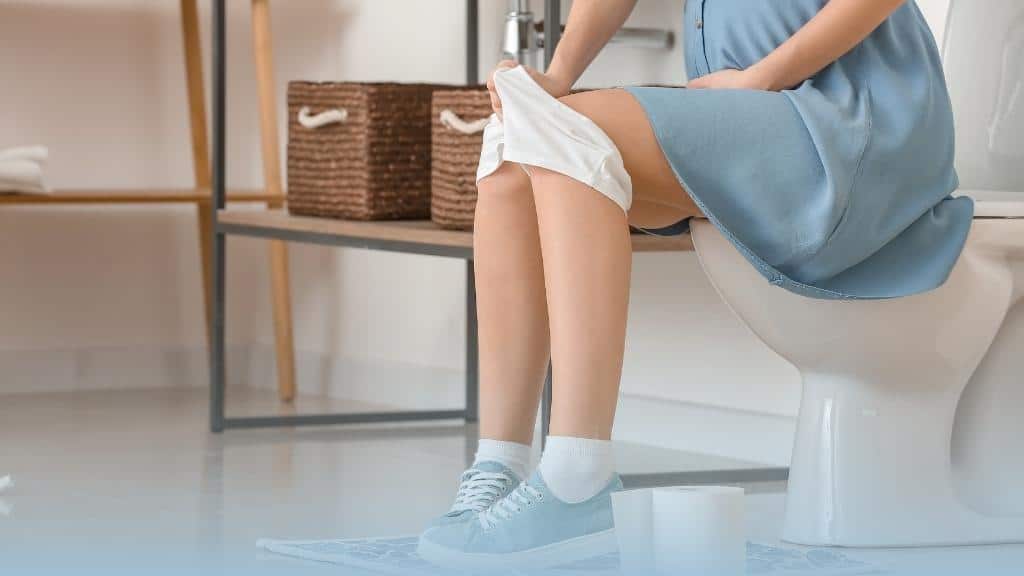
Table of Contents
Fecal incontinence or bowel incontinence is a situation where there is a loss of control in the bowel resulting in fecal elimination or involuntary movement of the bowels. This experience can range from an involuntary passage of smaller stool amounts up to a complete loss of bowel control.
Those who experience this incontinence of the bowel movements are said to feel the urge to have bowel movements but do not have the control to wait until they reach the washroom. However, on the other hand, the others don’t even feel the sensation of a pending bowel movement, resulting in the unknowing passing of stool.
Causes Of Bowel Incontinence in Females
First, although fecal incontinence is uncomfortable, it can be treated with proper care and the right initiatives.
But, what are the bowel incontinence causes?
Normal bowel control relies on the proper functioning of the:
- Pelvic muscles
- The Rectum (part of the lower end of the large intestine)
- Anal sphincter muscles (the anus muscles)
- Nervous system
And, any kind of injury that affects the areas as stated above can cause fecal incontinence. Some common causes of bowel incontinence include:
1) Fecal Impaction
This is chronic constipation that has the possibility of leading to fecal impaction. This is experienced when a hard stool gets stuck in the rectum which can stretch and weaken the sphincter, making the muscles incapable of controlling the passage. Another complication of this impact of fecal impaction is the leakage of liquid fecal matter through the anus.
2) Diarrhea
Diarrhea could be caused by either liquid or loose stools that have the potential of causing an immediate need for bowel movement. In such a case, the need could be so sudden with no time left to reach a bathroom.
3) Hemorrhoids
External hemorrhoids could block the sphincter from closing and allow mucus and loose stools to pass involuntarily.
4) Damaged Muscle
Any kind of damage caused to the anal sphincter prevents the muscles from keeping the anus tightly closed. Here, the causes could be surgery near or in the anorectal region, constipation, and trauma that could damage sphincter muscles.
5) Damaged Nerves
In case the controlling nerves of the sphincter movement are damaged, then it could prevent it from completely closing. When this happens, there will be no urge or lack of sensation, indicating the need to go to the bathroom.
Here is some indication of nerve damage:
- Any kind of trauma from giving birth
- Chronic constipation
- MS or multiple sclerosis
- Stroke
- Diabetes mellitus
6) Pelvic floor dysfunction
In comparison to men, women tend to experience or undergo damaged muscles and nerves in their pelvis region specifically during childbirth, whereas the cases in men are limited. However, the symptoms of pelvic floor dysfunction might not immediately be noticeable and may occur over a few years.
The complications include:
- Weakness in the pelvic muscles used during bowel movements
- Rectal prolapse is when the rectum protrudes through the anus
- Rectocele is when the rectum bulges down into the vagina
Bowel Incontinence: The Risks Involved
Bowel incontinence can be experienced by anyone, nevertheless, there are certain people who have a higher chance in comparison to others. One could be at a higher risk if:
- Over the age of 65
- A woman
- Women who have given birth
- Have chronic constipation
- Have a disease or injury caused nerve damage
Incontinent of Bowel: How Is It Diagnosed?
Bowel incontinence can be diagnosed after the doctor runs through your medical history and physically evaluates fecal incontinence. They might ask you about the frequency of the incontinence, the occurrence, diet, health issues, and medications.
Listed below are the possible tests that they might ask you to get done:
- Digital examination of the rectal area
- Stool culture
- Barium enema (this is the fluoroscopic X-ray of the large intestine, including the rectum, colon, and barium contrast)
- Certain blood tests
- Electromyography (this is to test the muscle functioning and related nerves)
- Anorectal ultrasound
- Proctography (X-ray video imaging during a bowel movement)
Bowel Incontinence Home Remedies: How Can It Be Treated?
The treatment for bowel incontinence depends on the cause of occurrence. Some treatments include:
1) Diet
Eliminating foods that could possibly cause diarrhea or constipation must be avoided. It will help regulate and normalize bowel movements. Your doctor may also recommend an increase in fluid intake and fiber.
2) Medications
For diarrhea, you could take antidiarrheal medications like codeine, loperamide (Imodium), or diphenoxylate/atropine (Lomotil), prescribed to slow down the movement in the large intestine and allow the stool to pass through slowly. Also, an increase in fiber intake is a must!
3) Bowel Retraining
One can also follow a retraining routine to strengthen normal bowel movements. This includes:
- Following a regular schedule to sit on the toilet
- Use of rectal suppositories for bowel movement stimulation
4) Incontinence Undergarments
During the strengthening process, one can also choose to wear undergarments that are specially designed for added protection. These are easily available in reusable and disposable forms, while there are other brands that use technology to minimize odor.
5) Kegel Exercises
This will help strengthen the pelvic floor muscles. It involves a routine of repeated muscle contractions used when going to the bathroom. Consult your doctor to help learn the correct ways of performing these exercises.
6) Biofeedback
This is an alternative medical technique where you get to learn to use your mind to help control bodily functions with the help of sensors.
In the case of fecal incontinence, biofeedback helps learn the ways to control and strengthen the sphincter muscles. At times, there can be medical equipment used as well to help train the rectum and anus. Adding here, the doctor would also perform a test to understand the rectum and anal sphincter muscle functioning.
These muscle tones are measured and visually displayed on a screen to observe the strength of the muscle movements. Post this, you would be given feedback on how to improve the control of rectal muscles (the “bio”).
7) Surgery
This is generally reserved for severe situations of fecal incontinence. There are many surgical kinds available, such as:
- Sphincteroplasty – Here, the torn ends of the anal sphincter are brought back to help strengthen the muscle and get the anal sphincter tightened.
- Gracilis muscle transplant – Where the gracilis muscle is transferred from the inner thigh to around the anal sphincter muscle. This helps with the needed strength and support.
- Artificial sphincter – This is a silicone ring that is implanted around the anus. It can manually deflate in an artificial sphincter for defecation and then inflate it to close the anus to prevent any leakage.
- Colostomy – Those who have severe fecal incontinence choose to undergo colostomy. Here, the large intestine’s end is redirected and is passed through the wall of the abdominal. A disposable bag is then attached to the abdomen around the stoma (a portion of the intestine attached to the opening through the abdomen). Once complete, there is no stool that passes through the anus but gets emptied from the stoma into the disposable bag.
8) Solesta
This is an injectable gel that was approved by the Food and Drug Administration (FDA) in 2011 to treat fecal incontinence. The goal of this therapy is to increase the amount of rectal tissue.
Solesta is injected into the anus wall and effectively reduces or treats fecal incontinence in some people. It causes an increased thickness and bulk of the anal tissue that then narrows the anal opening and also helps it stay tightly closed.
To Conclude: Bowel Incontinence and Prevention
Although experiencing bowel incontinence is a common cause of aging, medical conditions, and past trauma, it might not always be preventable. Having said that, the risk, before it worsens can be reduced by maintaining a regular bowel movement, healthy consumption of food, and keeping the pelvic muscles strong with preventive measures taken.
Bowel Incontinence FAQs
1) What does normal bowel movement rely on?
2) How can I stop bowel incontinence?
3) How do you stop bowel incontinence naturally?
4) What medications can cause bowel incontinence?
5) What kind of doctor do you see for bowel incontinence?

Dr. Mitali Rathod
Hi! I'm Dr. Mitali Rathod, and I have a deep passion for all things related to menstruation, hormones, pregnancy, and reproductive health. I enjoy simplifying these complex topics on social media to empower women with a better understanding of their bodies. My mission is to assist women in comprehending the intricacies of periods and reproductive health through a holistic and sustainable approach.
Over the past eight years and counting, I've been dedicated to helping women achieve their best possible health. This journey has included the safe delivery of over 3000 babies, both through vaginal and C-section procedures.
I take pride in my contributions to some of Ahmedabad's and Gandhinagar's best government hospitals, such as V.S. General Hospital, S.C.L. General Hospital, and Civil Hospital of Gandhinagar. My commitment to women's health and well-being continues to grow, and I look forward to making a positive impact on even more lives in the future.




